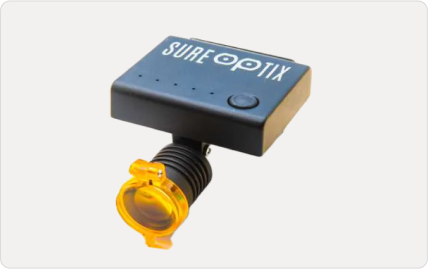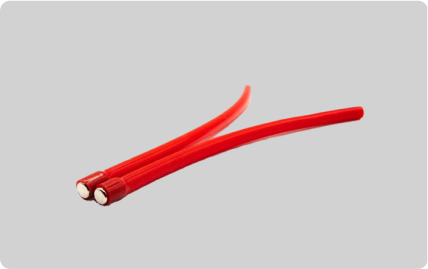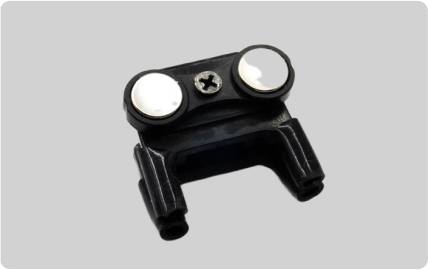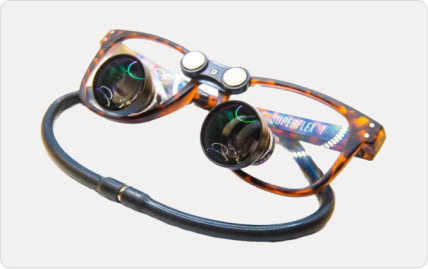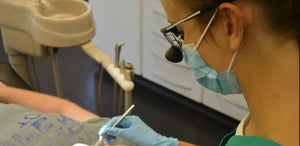
Questions to Consider When Buying Dental Loupes
Dental professionals often understand/find themselves in situations where precision and attention to detail are crucial. Dental loupes, or magnifying glasses worn by dentists, dental hygienists, and dental surgeons, play a pivotal role in enhancing visual acuity during dental procedures. These optical devices enhance a dentist's ability to diagnose and perform intricate procedures effectively. This guide is your compass in navigating the world of dental loupes, helping you make informed choices that benefit both your practice and your patients.
Understanding Dental Loupes
Dental loupes are precision optical instruments that have become indispensable in modern dentistry. They are magnification devices that dental professionals wear to provide an up-close, detailed view of the oral cavity during procedures. Their importance in dentistry cannot be overstated. They allow dentists to visualize even the tiniest anatomical structures with exceptional clarity, enabling accurate diagnosis and precise treatment.
Different Types of Dental Loupes
Dental loupes come in a variety of types, each designed to cater to the specific preferences and needs of dental professionals. Understanding the differences between these types is crucial when selecting the loupes that will best serve your practice. Here, we'll explore the various options available:
Through-the-Lens (TTL) Loupes:
- Built into Eyewear: TTL loupes are integrated into custom eyewear, providing a lightweight and compact solution.
- Greater Stability: Because they are firmly affixed to the frames, TTL loupes offer excellent stability during procedures.
- Streamlined Design: They have a sleek appearance and don't require additional hardware, making them less obtrusive.
Flip-Up Loupes:
- Adjustable Magnification: Flip-up loupes allow for adjustable magnification, providing flexibility during various procedures.
- Easy to Share: They can be shared among multiple practitioners, as they can be flipped out of the way when not in use.
- Quick Transition: Dentists can easily switch between magnified and non-magnified views by flipping the lenses up and down.
Prismatic Loupes:
- Compact Design: Prismatic loupes use prisms to fold the light path, resulting in a more compact design.
- Wider Field of View: The prism design often offers a wider field of view, enhancing visibility.
- Advanced Optics: Prismatic loupes are known for their advanced optical quality, providing a clear and sharp image.
Galilean Loupes:
- Lightweight: Galilean loupes are known for their lightweight construction, reducing strain on the user.
- Moderate Magnification: They typically offer moderate magnification, suitable for a wide range of dental procedures.
- Longer Working Distance: Galilean loupes are well-suited for procedures that require a longer working distance.
Telescopic Loupes:
- High Magnification: Telescopic loupes offer higher magnification levels, ideal for intricate and detailed work.
- Enhanced Depth Perception: Their design provides improved depth perception, which is crucial for precise dental procedures.
- Customizable Working Distance: Telescopic loupes often allow for customizable working distances to suit individual needs.
Wireless Loupes with Integrated Lighting:
- Enhanced Visibility: These loupes come with built-in LED lighting, ensuring clear visibility even in low-light conditions.
- Wire-Free Operation: The wireless design eliminates the need for cords, enhancing mobility and convenience.
- Improved Patient Comfort: The integrated lighting reduces the need for additional lighting sources that can be uncomfortable for patients.
Loupe-Mounted LED Lights:
- Modular Solution: Loupe-mounted LED lights can be attached to various loupes, providing flexibility.
- Direct Illumination: They offer direct illumination of the treatment area, enhancing clarity.
- Portability: These lights can be easily moved and adjusted for precise lighting during procedures.
By understanding the different types of dental loupes, dental professionals can make informed choices based on their unique requirements, preferences, and the specific procedures they perform. Each type of loupe offers distinct advantages, and the right choice can significantly impact the quality of care provided and the comfort of the practitioner.
Benefits of Using Dental Loupes
The advantages of using dental loupes are multifaceted. They go beyond the simple concept of magnification. These optical devices reduce strain on the neck and back, leading to greater comfort during prolonged procedures. Additionally, they significantly enhance vision, enabling the dentist to spot even the most minute details within the oral cavity. This heightened level of precision, in turn, leads to improved treatment outcomes, benefiting both the dentist and the patient.
Understanding dental loupes involves recognizing their role in providing dentists with unparalleled precision, the different types available, and their array of benefits. These essential tools are the cornerstone of modern dentistry, empowering dental professionals to provide optimal care with exceptional accuracy.
Key Considerations When Buying Dental Loupes

Purchasing custom-made dental loupes is a significant investment for a dental professional. To ensure that you get the best possible loupes tailored to your specific needs, here are some important questions to ask before making the purchase:
Q1. What are the available magnification options?
Determine the available magnification levels to choose the one that best suits your specific dental procedures. Your age, your visual acuity (your prescription), and the type of loupes that you used in the past will all affect the magnification that you need. Contrary to what is becoming common advice in dental schools, too much magnification can affect your work negatively. Just remember that as you age, you will need higher magnifications. Most Dental loupe companies carry 2.5X, 3.0X, 3.3X, 3.5X, and 4.0X. Magnification can go all the way up to 10X.
Q2. What is the working distance for the custom loupes?
Working distance refers to the space between your eyes and the treatment area. It significantly affects your comfort and ergonomics during procedures. Ensure that the working distance is customized to your needs to maintain ergonomic comfort during procedures. Most working distances fall between 16 to 20 inches. If you wear prescription eyeglasses, your working distance can greatly be different from someone without a prescription. Ask your loupe company if the working distance can be changed after you've purchased the loupes. Your height, your old habits, and even your office setup can affect your working distance.
Q3. What is the field of view for the loupes?
The field of view determines how much of the oral cavity you can see while wearing loupes. A wider field of view allows for better visualization and improved clinical outcomes. Also, striking the right balance between field of view and magnification is crucial for effective dental work. Generally speaking, the new high-definition loupes have a comfortable viewing field.
Q4. Can I choose the frame style and design?
The frame style impacts not only aesthetics but also your overall comfort during prolonged use. Ask about customization options for the frame style and design to ensure it meets your personal preferences. Loupes come in various frame styles, including through-the-lens (TTL) and flip-up loupes. TTL loupes are attached directly to the glasses, while flip-up loupes can be flipped out of the way when not in use. Choosing the right fit for your frame can be one of your most important choices. Don't settle for just function; many loupe companies offer comfortable and stylish frames.
Q5. Are there options for integrated lighting?
Inquire about the availability of integrated lighting systems or the compatibility of your custom loupes with external lighting sources. Some loupes come with built-in LED lights, which can be incredibly helpful for illuminating the treatment area. This feature is especially valuable in cases of poor ambient lighting. Generally, wireless lights are preferred because you don't have to deal with wires. However, wireless lights tend to be much heavier.
Q6. Can prescription lenses be integrated into the loupes?
If you require prescription lenses for vision correction, inquire whether they can be seamlessly integrated into your custom loupes. Getting your eyes checked before you make a dental loupe purchase is important.
Q7. What materials are used for the loupes and frames and the carrier lenses?
The quality of optics plays a vital role in the clarity and precision of your work. High-quality loupes offer sharp and distortion-free images, enabling you to make accurate diagnoses and perform precise procedures. Understand the materials used in the construction of the loupes and frames to ensure they are durable and comfortable. Aluminum housing on your loupes, titanium frames, and Trivex lenses for the carrier lenses are your most premium materials.
Q8. What is the estimated delivery time for custom loupes?
Get a clear timeline for the manufacturing and delivery of your custom loupes, especially if you have specific needs or deadlines. If a manufacturer takes more than two weeks to make your loupes, chances are they are being made overseas. You better believe it; you can be charged thousands of dollars for a loupe that's made in China!
Q9. What is the warranty and return policy for custom loupes?
Check the warranty and customer support offered by the manufacturer. Understand the warranty terms and return policy in case your loupes don't meet your expectations or have manufacturing defects. A reliable warranty ensures that you can have your loupes serviced or replaced if any issues arise. Good customer support can help you with any queries or concerns along the way.
Q10. Do you offer a trial period or satisfaction guarantee?
Ask whether a trial period is available during which you can test the loupes to ensure they meet your specific requirements. Additionally, inquire about a satisfaction guarantee, ensuring you have peace of mind with your purchase.
Q11. Can you provide references or testimonials from other dental professionals who have purchased custom loupes from your company?
Researching dental loupe brands, reading user reviews, and seeking recommendations from peers help in selecting reliable products. Hearing from other customers about their experiences can provide valuable insights into the quality and reliability of both the product and the company. Consider seeking references or testimonials to make an informed decision.
Q12. What is the total cost, including any customization fees and accessories?
Request a detailed breakdown of the total cost, encompassing customization fees and any additional accessories or features you may need. A comprehensive cost analysis ensures that you are fully informed about your investment.
Q13. What Kind of strap will I get with my purchase?
The seemingly minor detail of the strap can significantly impact your experience. Custom magnetic straps or retainers are often the best choice for easy on and off. Ensure you choose a strap that complements your needs and preferences.
Q14. What maintenance and care instructions should I follow?
Last but not least, Proper cleaning and maintenance practices are vital for your loupes' longevity and optimal performance. Follow the manufacturer's guidelines to protect your investment.
Understanding the answers to these questions will not only aid in your loupes selection but also provide peace of mind and confidence in your choice. A thorough understanding of every aspect of your dental loupes is the key to making a well-informed and confident decision.
General Tips/Guidelines On Properly Maintaining Your Dental Loupes
Maintaining your dental loupes is essential to ensure their longevity and optimal performance. Proper care protects your investment and ensures you can continue providing precise and comfortable dental care. Here are some general tips and guidelines for maintaining your dental loupes:
-
Regular Cleaning: Clean your loupes regularly to remove debris, dirt, and sterilization residue. Use a soft, lint-free cloth to wipe the lenses and frames. Avoid using abrasive materials or alcohol-based solutions, as they can damage the coatings.
-
Use Recommended Cleaning Solutions: Consult the manufacturer's guidelines for approved cleaning solutions. These solutions are specifically designed for cleaning your loupes without causing damage.
-
Avoid High Temperatures: Keep your loupes away from high temperatures, such as autoclaves or direct sunlight. Prolonged exposure to heat can affect the integrity of the materials.
-
Proper Storage: Store your loupes in a protective case when not in use. This safeguards them from dust, moisture, and physical damage.
-
Regular Inspection: Periodically inspect your loupes for any signs of wear, loose screws, or other issues. If you notice any problems, contact the manufacturer or a reputable technician for repairs.
-
Adjustments: If your loupes have adjustable features, make sure they are set up correctly for your comfort and vision. Proper adjustments can reduce strain during long procedures.
-
Avoid Dropping: Handle your loupes with care, and avoid dropping them. Even minor drops can cause misalignment or damage.
-
Avoid Contact with Harsh Chemicals: Keep your loupes away from chemicals like disinfectants or acids. Clean them promptly and thoroughly if they come into contact with such substances.
-
Regular Servicing: Schedule regular servicing or maintenance check-ups with the manufacturer or a qualified technician. This ensures that your loupes remain in optimal working condition.
-
Protective Eyewear: Always wear protective eyewear over your loupes to shield them from any accidental splatter or debris during dental procedures.
-
Keep Them Dry: Avoid exposing your loupes to excessive moisture or humidity. Moisture can damage the lenses and the frames.
-
Educate Your Team: If you work with a team, ensure that everyone is aware of the proper handling and care of the loupes. This collective effort can help maintain their quality.
-
Documentation: Keep all relevant documents, such as user manuals, warranty information, and receipts, in a safe place. This documentation can be valuable if you need to refer to manufacturer recommendations or in case of warranty claims.
-
Prompt Repairs: If you notice any issues with your loupes, don't delay in getting them repaired. Timely attention can prevent further damage.
-
Professional Cleaning: Consider professional lens cleaning services from time to time to ensure a thorough and safe cleaning process.
By following these general tips and guidelines for maintaining your dental loupes, you can ensure that they continue to provide you with the precision and comfort you need for successful dental procedures. Proper care and maintenance are key to extending the lifespan of your loupes and protecting your investment.
Frequently Asked Questions (FAQs)
-
1. What magnification level is ideal for my dental practice? The ideal magnification level depends on the specific procedures you perform and your individual visual acuity. It's advisable to consult with a loupe specialist who can recommend the most suitable magnification for your needs.
-
2. How do I measure my working distance accurately? Accurate measurement of your working distance is crucial. Most loupe companies provide guidelines on how to measure it correctly. It's often done from the bridge of your nose to the treatment area.
-
3. Which is better, flip-up or through-the-lens loupes? Both types have their advantages. Flip-up loupes offer convenience, while through-the-lens loupes provide a larger field of view. The choice depends on your preferences and requirements.
-
4. Are prescription loupes necessary for me? Prescription loupes are essential if you require vision correction. They ensure you have a clear view of your work and can be customized to your prescription.
-
5. Can I use dental loupes with my prescription glasses? Yes, it's possible to use loupes with prescription glasses. However, it's important to ensure compatibility and comfort, and you may consider prescription loupes for a more tailored solution.
-
6. What is the average lifespan of dental loupes? The lifespan varies depending on factors such as the quality of the loupes, frequency of use, and maintenance. High-quality loupes can last anywhere from 5 to 15 years or more.
-
7. Do dental loupes come with warranties? Yes, most reputable manufacturers offer warranties. The terms and duration can vary, so it's essential to inquire about the specific warranty for the loupes you choose.
-
8. How often should I have my loupes serviced? Regular servicing is recommended, usually on an annual basis. It ensures that your loupes remain in optimal condition and can prevent potential issues.
-
9. Are there any specific cleaning products for dental loupes? Yes, manufacturers often recommend specific cleaning solutions designed for loupes. Using approved cleaning products helps maintain the quality of the lenses and coatings.
-
10. How can I tell if I've chosen the right frame size? The right frame size should feel comfortable and secure. If the loupes sit comfortably on your nose, with a clear line of sight, you've likely chosen the right size.
-
11. Do I need adjustable pupil distance and angle settings? Adjustable settings enhance comfort and can reduce strain during prolonged use. While they are not essential, they offer a more customized experience.
-
12. What is the best method for financing dental loupes? Financing options may vary depending on the manufacturer. Exploring payment plans, loans, or financing programs is advisable to find the best method that suits your budget.
-
13. Can I switch between different magnification levels? Some loupes allow for interchangeable lenses, which can provide flexibility in magnification. Check with the manufacturer to see if this is an option.
-
14. How do I ensure that the loupes won't strain my neck and back? Proper adjustments and choosing loupes with ergonomic features are key. Ensure the loupes are customized for your height and working conditions.
-
15. Are there any specific lighting requirements for dental loupes? Dental loupes can be used with or without additional lighting. The choice depends on your preference and the specific procedures you perform.
-
16. Do dental loupes come in different colors or styles? Yes, many manufacturers offer customization options, allowing you to choose colors and styles that suit your preferences.
-
17. What are some reputable dental loupe brands in the market? Reputable brands include Orascoptic, SurgiTel, Designs for Vision, and Keeler, among others. Research and reviews can help you identify trusted manufacturers.
-
18. How can I make my dental loupes last longer? Proper care, regular maintenance, and handling your loupes with care can extend their lifespan.
-
19. Are there any downsides to using dental loupes? While dental loupes offer numerous benefits, they can be an initial investment. Some users may experience an adjustment period. However, the long-term advantages typically outweigh any drawbacks.
-
20. Can I buy dental loupes online, or should I visit a store? Both options are available. Buying online can be convenient, but visiting a store allows you to try loupes and get personalized recommendations.
-
21. What are some common mistakes to avoid when buying dental loupes? Common mistakes include not considering individual needs, failing to research reputable brands, and not seeking professional guidance when selecting loupes. Avoiding these mistakes ensures a better purchase experience.
Conclusion
In conclusion, dental loupes are indispensable tools for enhancing precision, reducing eye strain, and improving ergonomics in dental practice. Selecting the right dental loupes involves considering factors like magnification, comfort, optics, lighting, customization, and budget. You can enhance your dental practice and patient care by making an informed choice.






